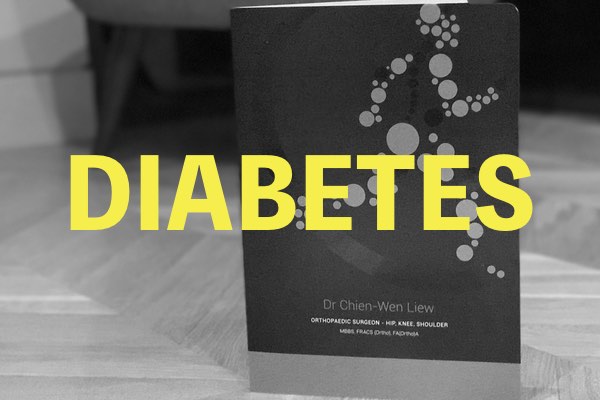
Dr Chien-Wen Liew
Orthopaedic Surgeon
KEY POINTS
-
Good diabetic control
-
Newer Diabetic medications need to STOP pre-operatively
-
Tell us about wounds and infections
Diabetes

This section is designed to guide patients who have Diabetes.
Diabetic control has improved over many years. The number of treatment options has also changed. Some of these newer treatment options require special consideration around the time of your surgery. Some guidelines to help with navigating and identifying potential issues related to your diabetic control are detailed below.
- DIABETIC CONTROL: Good diabetic control is essential to reducing the complications associated with life, in addition to your upcoming total hip replacement. Often good glycemic control is shown by a Haemaglobin A1C level, which your doctor would normally order as a blood test for you once every 3 months. It is a good indicator of how well your sugar control has been over the 3 month period. In general, an HbA1c which is greater than 8% is something that requires further optimisation before consideration of hip replacement surgery as it can increase the incidence of infection. Reference LINK.
- Medications such as METFORMIN and DIAMICRON: These oral diabetic medications often form the basis of your sugar control, and in general, should continue throughout your peri-operative period. Please check with the anaesthetist to determine which medications of these should continue and which should cease.
- NEW MEDICATIONS TO CEASE: Newer medications called SLGT2 medications need to be stopped 3 days before your surgery. So the LAST DOSE should be taken 3 days prior to your surgery date. i.e. if surgery is scheduled for THURSDAY, the LAST DOSE should be taken on MONDAY. Medications include: Forxiga, Xigduo, Qtern, Jardiance, Jardiamet, Glyxambi, Steglatro, Segluromet, Steglujan.
- Injectible insulin – you should hold off on injecting your usual injectable insulin during your fasting period.
- WOUNDS: In general, chronic diabetics have glucose circulating at higher levels in the blood stream. This can increase the risk of infection and wound healing. It is highly important for you to advise us if you have a new wound, non healing ulcer, or any infections in your body that you are dealing with, as this will mean that we will reschedule your surgery in order to minimise the risk of infection. i.e. gum/tooth infections, skin ulcers, infected ingrown toenails, abscesses etc.
TIPS: Not all the information on this page will be relevant to your personal situation. If you have queries in relation to this information, please do not hesitate to contact us via Email or Phone to clarify your plan.
